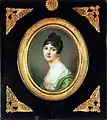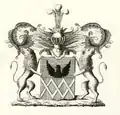Naryshkin family
The Naryshkin family (Russian: Нарышкины) was a noble Moscow boyar family of Crimean Tatar descent,[1][2] going back to a certain Mordko Kurbat Naryshko, a Crimean Tatar, who moved to Moscow in the 15th century.[3] It became allied to the ruling house in 1671 when the great beauty Natalia Naryshkina (daughter of Kirill Poluektovich Naryshkin) married Alexis of Russia, later becoming the mother of Peter the Great. The Naryshkin family was persecuted under the regency of Tsarevna Sophia Alekseyevna of Russia, but were then highly favoured by Peter and his descendants and played a major part in Russian life.
- For those with this surname who were not members of this family, see Naryshkin.
Other notable members
- Kirill Alexeyevich Naryshkin (1670–1723), Commandant of Pskov and of Dorpat 1704 - 1710, commandant of Saint Petersburg 1710 - 1716, governor of Moscow 1716-1719
- Alexis Vasilievich Naryshkin (1742–1800), chamberlain from 1773, diplomat, scholar, friend of Denis Diderot (offering lodging in his house during Diderot's stay in Saint Petersburg, at Place Saint-Isaac, n° 8)
- Alexander Lvovich Naryshkin (1760–1826), friend of Paul I of Russia, who called him his 'uncle'; he served simultaneously as grand chamberlain, chancellor and grand marshal of the nobility; he also served for a long time as head of the theatres and attracted the top artists from Europe (particularly from France) to Russia.
- Maria Naryshkina (1779–1854), née Princess Maria Svyatopolk-Chetvertinskaya, mistress of Alexander I of Russia
- Lev Kirillovich Naryshkin
- Lev Alexandrovich Naryshkin (1785–1846), Russian lieutenant-general, fought in the Napoleonic Wars
- Kirill Alexandrovich Naryshkin, member of the Council of State (1834)
- Alexander Alexeyevich Naryshkin (1839–1916), member of the Council of State (1906)
Images

 Vix and Prince Naryschkin in 1917
Vix and Prince Naryschkin in 1917
_with_son_Alexander.jpg.webp)



References
- Robert K. Massie, Peter the Great: His Life and World, Random House Publishing Group (2012), p. 19
- W. E. D. Allen, The Ukraine, Cambridge University Press (2014), p. 121
- Sergei O. Prokofieff, The Spiritual Origins of Eastern Europe and the Future Mysteries of the Holy Grail, Temple Lodge Publishing (1993), p. 460
This article is issued from Wikipedia. The text is licensed under Creative Commons - Attribution - Sharealike. Additional terms may apply for the media files.